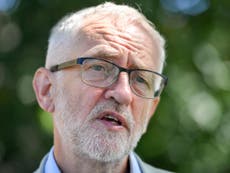This is the one thing Jeremy Corbyn shouldn't do if he wants to stop a no-deal Brexit
If the Labour leader agreed to an election, there's little evidence he could win it outright. Without an obvious alternative prime minister, Johnson would be entitled to stay in Downing Street – and he could hang on, daring the Queen to fire him

The Labour leader has been calling for an election for so long that he’ll have to agree if the prime minister asks for one, right? Not so fast.
Jeremy Corbyn would certainly need a reason to deny Boris Johnson an election if that’s what the Tory leader wants. But there is an exceptionally good reason to say no: there isn’t really time to hold one and get a new prime minister into Downing Street before we’re scheduled to leave the EU on 31 October. The priority must be to delay Brexit, otherwise an election might be pointless as we might already have crashed out of the EU by the time a new prime minister is in place. What’s more, it will probably be better to hold a referendum rather than an election – and that would need a delay too. So securing extra time should be the focus of Corbyn’s talks with MPs from other opposition parties today.
The Labour leader will say there’s a simple way to delay Brexit: kick Boris Johnson out of power in a vote of no confidence and make him prime minister instead. But that’s not the only way to get extra time. Johnson could himself ask the EU for a delay, either because MPs persuade him to or because they force him to do so by passing legislation. It is encouraging that Corbyn says, writing for the Independent on the eve of the talks, that he will look at all options including legislation to stop a no-deal Brexit.
It might seem futile for the Labour leader, the SNP’s Ian Blackford, Liberal Democrat leader Jo Swinson and the others to ask the prime minister to delay Brexit. Johnson has said we are leaving the EU on 31 October “do or die”. If he now ate his words, Nigel Farage would accuse him of being a traitor. So he’s sure to say “no”. But sometimes in politics it is sensible to ask for something even if you know you’re not going to get it – especially if what you are asking for is reasonable. And asking for extra time so we don’t crash out of the EU unless that’s what the people really want is eminently reasonable.
Now the prime minister could counter by saying there’s no need to delay Brexit. He’ll just call an election on 17 October, an idea senior Tories are considering, according to the Sunday Times. But Corbyn shouldn’t fall for such a ploy. Quite apart from the fact that he should be worried that Johnson might actually win such an election, there still might not be time to form an alternative government in the event that the Tories lose.
It’s only if Labour won an overall majority that Johnson would have to resign immediately – and that doesn’t seem remotely likely right now. If no party party achieves a majority, the sitting prime minister can hang on until the new Parliament meets to see if he or she can command the confidence of the House of Commons, according to the Cabinet Manual. (See section 2.12).
The problem is that Parliament doesn’t meet immediately after an election. There’s normally a five or 12 day interval. If the election is held on 17 October, this means Parliament would probably first sit on 23 October, or even as late as 30 October. What’s more, it’s up to the sitting prime minister to advise the Queen when to summon the new Parliament – so he could drag it out until after 31 October.
Even if Johnson agreed that Parliament should return on 23 October, there still might not be enough time. Before MPs can do anything, they need to elect a speaker and take an oath, and that process normally takes a few days.
Meanwhile, there would be frantic discussions between the opposition parties about whether to make Corbyn or somebody else prime minister. Unless and until it was clear that a rival prime minister could indeed form a government, Johnson would be entitled to stay in Downing Street. It’s possible that he might hang on even after that, daring the Queen to use her reserve powers to fire him.
Even if all that was sorted out in record time, the new prime minister might still need a few more days to persuade the EU to delay Brexit. It’s easy to see how we’d first crash out.
Given all this, Corbyn should not agree to an election until and unless Johnson first asks the EU for extra time. If Labour sticks to its guns, the prime minister won’t be able to get an election – because under the Fixed Term Parliaments Act, two-thirds of all MPs have to vote in favour.
Now Corbyn could still press ahead with his plan for a vote of no confidence in Johnson, an alternative way of getting a snap election. But this wouldn’t be sensible until he can be confident that the other parties and at least a handful of Tory MPs would support him to run an emergency government – and that, for now, seems most unlikely.
The best bet is to pass legislation forcing Johnson to ask for extra time in order to hold a referendum, and only if that fails to have a vote of no confidence. It’s only as a last resort that enough MPs from other parties are likely to stomach the possibility of the Labour leader taking the keys to Downing Street.
So Plan A should be to ask Johnson to delay Brexit. Plan B should be to force him to ask for a delay. Plan C should be a vote of no confidence. And under no circumstances should Corbyn give Johnson an election, unless the prime minister himself first asks for extra time.
Hugo Dixon is editor of InFacts and deputy chair of the People’s Vote campaign



Join our commenting forum
Join thought-provoking conversations, follow other Independent readers and see their replies